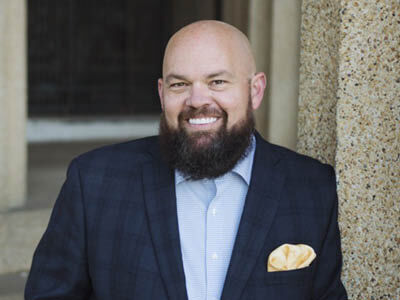Alabama promised to improve psychiatric care for men charged with crimes. They still wait years
News > National News

Audio By Carbonatix
12:01 AM on Wednesday, November 12
By SAFIYAH RIDDLE
MONTGOMERY, Ala. (AP) — Fernando Clark spent the last 10 months of his life in a jail cell, waiting for psychiatric treatment a court ordered he undergo after he'd been arrested for stealing cigarettes and some fruit from a gas station.
He died while waiting for the treatment that never arrived, found unresponsive in his jail cell.
Clark was just one of hundreds of people across Alabama awaiting a spot in the state's increasingly limited facilities, despite a consent decree requiring the state to address delays in evaluating and providing care for people suffering from mental illness who are charged with crimes.
Seven years since the federal agreement, the problem is only worse. The waitlist for the state's sole secure psychiatric facility is almost five times longer than when it the decree was issued, according to court documents released in September.
Sometimes arrestees are waiting years for placement in a facility designed to treat their illness and ensure they are healthy to go to court, a problem faced by many states around the country.
In Alabama, that means people charged with less serious crimes, like Clark, “spend more time waiting for a bed than if they had just pled guilty," said Bill Van Der Pol, a lawyer with the Alabama Disabilities Advocacy Program, which won the federal consent decree.
In 2010, the Department of Mental Health had its budget cut by $40 million in the wake of the recession. At least 10 state-run psychiatric facilities have closed over the past three decades, leaving only three inpatient facilities with 504 total beds, and just one where men facing criminal charges can receive treatment to restore them to competency.
The lawsuit that led to the consent decree was filed in 2016, alleging delays at every point in the process that violated constitutional due process.
First, there was a wait for psychiatric evaluations. Then if deemed unfit for trial, there was a wait for a spot at the lone secure facility that serves men: Taylor Hardin Secure Medical Facility. Finally, anyone deemed unable to be restored to competency for trial had to wait for longer-term treatment at community based facilities.
The 2018 consent decree gave the state two years to complete all mental health evaluations and reports within 60 days of a court order. A man deemed incompetent for trial should go to Taylor Hardin within 30 days after that.
The state was also required to expand the number of beds for more permanent care if someone cannot be rehabilitated.
Taylor Hardin's waitlist has grown to 273 men, according to an August court filing. That's up from approximately 60 men in 2017. The average wait is well over a year, and more than 30 people on the list have languished more than two years. The state is still in mediation with the plaintiffs.
Nationally, the number of state hospital beds for adults with serious mental health issues reached a historic low in 2023 with 36,150 beds, more than half of them occupied by people who were committed to the hospital through the criminal legal system, according to the nonprofit Treatment Advocacy Center. That's a 17% decline in beds from 2017, the organization found.
“There really isn't any state where this hasn't become an increasingly visible problem — and it's actually expanding in scope rapidly over the last decade,” Lisa Daly, the executive director of the Treatment Advocacy Center said.
In Nevada, for example, one county was ordered in April to pay $500 per day because defendants did not receive timely treatment. Officials estimated at the time that the payout would be $3.6 million for fiscal years 2026 and 2027, based on the current caseload and wait times, a county memo shows.
In some ways, the worsening trend is part of an intractable paradox, Daly said. Courts are “doing a better job over time of identifying when mental illness appears to be a factor in why somebody might’ve been arrested or why somebody might be facing criminal charges.”
For example, one study in Colorado found that the number of court-ordered restorations increased from 87 in 2001 to 900 in 2017, according to the federal Substance Abuse and Mental Health Services Administration, an agency within the U.S. Department of Health and Human Services.
That is a good thing, Daly said. But the infrastructure — the beds available at secure treatment facilities, along with the staffing levels to make those beds operational — has not adjusted to the increasing demand.
In other words, instead of waiting for evaluations, now people are waiting for treatment.
“Really what that does is it changes where the bottleneck is,” Daly said.
Alabama has taken steps to address that bottleneck.
Construction is underway to add 80 beds to Taylor Hardin, which currently has 140 beds and serves just over 200 people, according to an annual report published in 2024.
However, there is a significant staffing shortage and the added beds will only be usable if “proper staffing is obtained,” the report said. Only about half of the mental health technician and nursing positions are filled at the facility, Alabama Department of Mental Health Commissioner Kim Boswell said at a board meeting in August 2024, according to The Alabama Reflector. Boswell said an average pay increase of roughly $6 an hour in 2024 is helping with recruitment and retention.
The department has trained 94 people for competency restoration programs in jails to relieve the burden on Taylor Hardin, court records show. Programs now exist in five of Alabama’s 67 counties and are slated to expand to three more.
Alabama also has spent $175 million over five years to build six crisis centers with 180 beds across the state to provide a “more appropriate alternative to incarceration or emergency room visit” for people suffering a mental health crisis, a September audit shows. Those centers have conducted 22,297 evaluations, Boswell testified in September.
Boswell said at a recent budget hearing that her agency is working with the judges presiding over the consent decree to improve the time it takes to get evaluated and then treated.
A spokesperson for the Alabama Department of Mental Health declined to comment in response to multiple e-mailed requests.
Jennifer Tompkins, an Alabama criminal defense attorney, said the root of the problem is not only the number of beds. It can take decades to get released from Taylor Hardin — either to court, if the mental health crisis has been treated, or into an outpatient program offering more permanent support.
“It’s almost like you’re guilty because you’re mentally ill and in poverty,” Tompkins said.
One of her clients charged with murder over 10 years ago is still awaiting trial while he remains at a secure facility, where state psychiatrists have issued numerous conflicting assessments of his mental capacity. There is similar backlog for the community-based facilities like the one Clark was waiting for.
Boswell acknowledged those challenges at a recent budget hearing, saying that her agency was working with the judges presiding over the consent decree to improve turnover.
Clark, who was 40 when he died, was known as “Pooch," a nickname his mom gave him as a kid because he was small and sweet like a puppy.
But he was troubled, with a long history of petty crimes and severe mental health issues.
His sisters said he was often picked up wandering aimlessly miles away from where he lived with family in Montgomery. Permanent treatment was often hard to come by because many facilities would refuse to treat his psychiatric issues because he also took drugs, and he needed to be sober to receive treatment.
“It’s a lot. We just had so many different incidents,” Kawanda Key, one of Clark’s older sisters said. Clark did short stints in hospitals, where he would call his sisters and ask them to bring him chocolate. Whenever one of them encountered him on the side of the road, they would try to convince him to come home where he could eat and shower.
Last year, Clark went missing again, skipping out on a 2022 burglary charge. His sisters asked the police to help find him, despite their fear he'd end up in a jail unable to handle his needs. He was eventually found and put in jail in February 2024, and it wasn't until September of that year that his mental illness was deemed untreatable, and he was ordered to stay in jail until a bed could be found for him to receive care.
“He wasn’t aggressive” Subrina Hamilton, one of Clark's other sisters said, but “these people in the jail don’t know that.”
His sisters wanted to see him but they weren't on his list of visitors. Another sister, Tameka Clark, would call the jail regularly to check up on him, assured by jail staff that her younger brother was “fine.”
But on Dec. 11, 2024, Clark was found unresponsive in his cell. The temperature in the cell had risen to 110 degrees Fahrenheit (43.3 degrees Celsius) at a time when boiler repairs were being done. His autopsy lists congestive heart failure as his cause of death, but Tom Andrew, a forensic pathologist who reviewed the autopsy for The Associated Press, said it left “more questions than answers."
Clark’s autopsy said he had access to water but didn’t give specifics. Given the temperature in his cell, Andrew said, it was “problematic” that the autopsy didn’t record Clark’s internal body temperature or rule out other signs of dehydration.
Additionally, Andrew noted, jail staff was giving Clark antipsychotic medication at the time of his death that sometimes impairs the body’s ability to regulate temperature, making him especially vulnerable to overheating.
The state law enforcement agency investigating Clark’s death declined to comment, citing an ongoing investigation. Montgomery County Sheriff Derrick Cunningham also declined to comment specifically on Clark's death.
Cunningham said jails are ill-equipped to deal with men like Clark as they wait for psychiatric beds. Jails have difficulty identifying mental health issues, administering medication and navigating complicated behavioral issues, he said.
Even with the significant improvements the department is making, Cunningham said, jails will continue to struggle.
“If you look at the number of beds we got and then the wait time, I mean, it’s still not enough,” he said.







